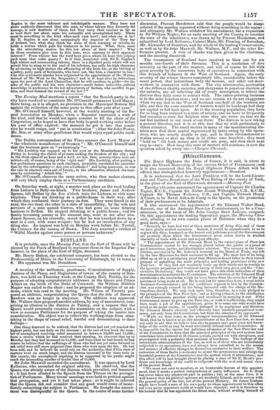SCOTLAND.
It is probable, says the Morning Post, that the Earl of Home will be elected by the Peers of Scotland to represent them in the Imperial Par- liament, in the place of the Earl of Elgin, deceased.
Mr. Henry Bishop, the celebrated composer, has been elected to the Professorship of Music in the University of Edinburgh, by 14 votes to S. His opponent was Mr. Donaldson.
A meeting of the noblemen, gentlemen, Commissioners of Supply, Justices of the Peace, and Magistrates of towns of the county of Ren- frew, was held on Thursday week, at the County Hall, Paisley, for the purpose of adopting congratulatory addresses to the Queen and Prince Albert on the birth of the Duke of Cornwall. Sir William Millikin Napier was called to the chair ; and he proposed the adoption of an ad- dress, which was read to the meeting. Mr. Wilson of Thornly pro- posed an addition, congratulating the Queen that the title of Baron of Renfrew was no longer in abeyance. The addition was approved. Mr. Wallace then proposed another address, by way of amendment, com- prising an allusion to the distress in Paisley, and a request that the Queen would personally examine the statements on the subject, with a view to summon Parliament for the purpose of taking the matter into consideration. His object was to relieve the working-class from alms- taking in the shape of casual relief, hurtful and demoralizing to their feelings— One thing deserved to be noticed, that the distress had not yet reached the highest point, but was daily on the increase : at the end of last week the num- ber of unemployed receiving relief amounted to between 10,000 and 11,000; from a return which he had received that morning, he observed that up to Monday last they had increased to 11,100; and from what be had heard, he had reason to believe that the sufferings of those who had not yet come forward to ask relief were still more poignant than those who were upon the list. He had been told, and he believed he could rely on the authority, that if this state of matters went on much longer, and the distress increased in the same ratio in this county, the unemployed requiring to be supported by the public might reach the astounding number of double that of 11,000.
Sir John Maxwell seconded the amendment. It was opposed by Lord Jiclburne, who seconded the original address. He observed, that the Queen was already aware of the distress which prevailed, and lamented it : it had been alluded in the Speech from the Throne on the proroga- tion of Parliament. Many towns' meetings were held to petition against that prorogation, and yet it had taken place : so it might be inferred that the Queen did not consider that any good would come of imme- diately submitting the subject to Parliament. He thought the amend- ment was disrespectful to the Queen. In the course of some further discussion, Provost Henderson said that the people would be disap- pointed if the meeting separated without doing something in the matter; and ultimately Mr. Wallace withdrew his amendment, but a requisition to Sir William Napier, for an early meeting of the County to consider the state of the inhabitants, was drawn up by Provost Henderson and subscribed by Lord Kelburne, Colonel Mure, Mr. Fleming of BaroChan, Mr. Alexander of Southbar, and the whole of the leading Conservatives, as well as by Sir John Maxwell, Mr. Wallace, M.P., and the other Re- formers present. A vote of thanks was then given to the chairman, and the meeting dissolved.
The ironmasters of Scotland have resolved to blow out for six months one-fourth of their furnaces. This is a resolution of dire necessity on the part of the masters, and will of course be felt with great severity by the numerous body of operatives in connexion with this branch of industry in the West of Scotland. Again, the early severity of the winter throws completely idle, considerably before the usual period, that industrious body the masons, and other out-door- workers in connexion with them. The city missionaries, secretaries of the different charity societies, and clergymen in populous districts of the suburbs, are all soliciting aid of every description, to relieve the distress they daily come in contact with. The calico-printing business is in the most hopeless state ; and we are certain we do not exaggerate when we say that in the West of Scotland one-half of the workers are idle, and that the same number of masters would be bankrupt had they not capital to fall back upon. As to the weaving population, they have- for so long been reduced to a state of misery, and we have so frequently had occasion to state the helpless state they are come to, that we do not feel inclined to say more about them. The distress is now taking a general direction, and it is to this fact that we wish particularly to direct attention. The small dealers in many of the manufacturing dis- tricts now find their capital represented by debts owing by idle opera- tives, who are utterly unable to pay, and in these circumstances to realize money or shut up shop is in either case hopeless ; they must "hold on" till both money and credit are gone, and then their next step is—ruin. How long this state of matters will continue, is now the- question asked by every one.—Glasgow Chronicle.


























 Previous page
Previous page